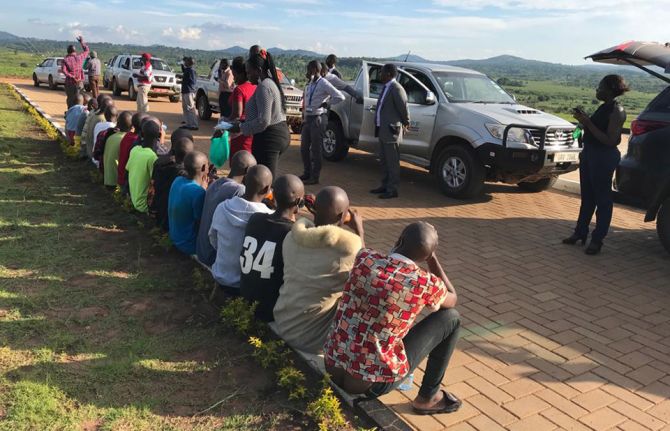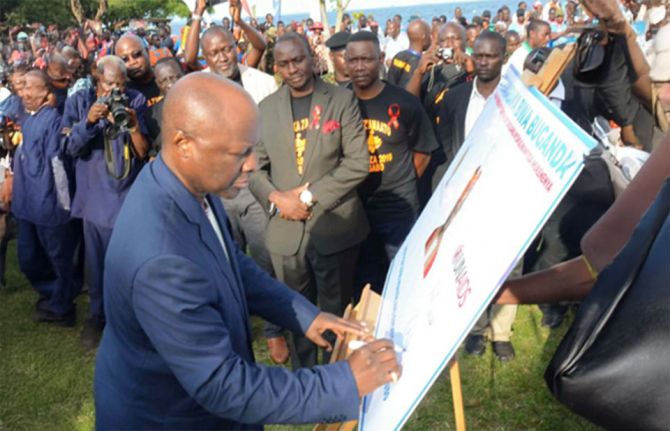

Feature Story
By any means necessary: defending human rights in Uganda in the time of COVID-19
22 September 2020
22 September 2020 22 September 2020Adrian Jjuuko heads up the team at Human Rights Awareness and Promotion Forum (HRAPF) in Kampala, Uganda.
He is the dictionary definition of an ally—a heterosexual lawyer who defends people who live on the margins of Ugandan society: lesbian, gay, bisexual, transgender and intersex (LGBTI) people, sex workers, refugees, people who use drugs and women who are survivors of domestic violence.
Mr Jjuuko founded HRAPF in 2008 to create awareness of human rights and provide legal support to marginalized people, mostly members of the LGBTI community.
“This is not the favoured job of a lawyer in Uganda,” he laughed. “When young graduates come out of law school, most would choose commercial litigation. I chose this. I chose it because I love it,” he added.
HRAPF started out as an organization that represented marginalized people but increasingly took on cases from members of the LGBTI community. Mr Jjuuko said that this is because, in Uganda, LGBTI people “are generally not treated like citizens with rights—not by law, culture or religion.”
Because of the stigma around the work that HRAPF does, “other lawyers don’t think we are real lawyers,” said Mr Jjuuko. “You live with the professional discrimination,” he sighed.
Uganda is one of 13 countries in the eastern and southern African region that criminalizes same-sex sexual relations. Under the Penal Code, “carnal knowledge against the order of nature” between two males carries a potential penalty of life imprisonment.
Evidence shows that the more marginalized, stigmatized and criminalized people are, the higher their vulnerability to HIV and violence.
Roughly one quarter of the 580 000 new HIV infections in the region in 2019 were among key populations and their sexual partners.
In sub-Saharan Africa, one in three transgender women have been attacked and 28% raped at least once in their life.
HRAPF represented the 14 gay men, two bisexual men and four transgender women (known as the COSF20) who were arrested in late March 2020 when police raided the Children of the Sun Foundation premises, an LGBTI shelter on the outskirts of Kampala. They were between the ages of 18 and 25 years and had been thrown out of their homes because of their sexual orientation and/or gender identify.
Police said the young people were violating social distancing rules that banned gatherings of more than 10 people in public spaces, restrictions imposed due to the lockdown in response to the COVID-19 outbreak.
However, they were not in a public place, but the place they called home.
Mr Jjuuko said this is one of many cases where COVID-19 restrictions are being used to violate human rights. The young people were arrested on the site on the suspicion of homosexuality and the charge was later changed at the police station to take advantage of the government restrictions.
It took Mr Jjuuko and his colleagues 43 days of applications, letters, meetings and court dates for HRAPF to be granted access to their clients; another two to actually see them; another five to get the charges dropped and the first 19 released, and yet another seven days for the final detainee to be released.
Mr Jjuuko and his colleagues had to hitch rides on cargo trucks en route to the prison, and use motorbikes and bicycles, to access their clients because of the restrictions placed on the operation of motor vehicles during the lockdown.
During the 50 days they spent in jail, the young people were subjected to gross human rights violations, such as beatings with wire, burning with pieces of firewood between their thighs, and, in one instance, an anal examination in a bid to “prove” homosexuality.
This is not the end, said Mr Jjuuko. HRAPF wants the prison authorities to dismiss the staff who perpetrated the violations and damages paid to the young men and women.
HRAPF’s work has turned from legal aid to humanitarian assistance, said Mr Jjuuko. The young people need food. A place to stay. It’s not enough to get them out of jail when they have no means and nowhere to go.
“The reason we do this is because no one else is doing it. There are basically no other legal aid service providers for LGBTI people. That is a feeling of contribution that you can’t take away.”
COVID-19 has made things even more difficult.
“We all need to come together and fight COVID-19 but we must not forget about marginalization and discrimination. How can we tailor our support to marginalized people? How do we protect people’s rights … think about people who need access to medicine and people who can’t use public transport? We need to think about the multiple dimensions of vulnerability,” he said.
UNAIDS continues to support the work of HRAPF to advance human rights and the right to health among key populations in Uganda. In 2020, it provided technical and financial support for a six-month project, which included sensitization meetings on HIV and human rights for key population groups from civil society, including information on the provision of free legal services to members of the community who are detained.
On the consequences of his work on his life, Mr Jjuuko shrugged and said, “It doesn’t matter. You just learn to live with it.” And in the same breath, he added,” As a lawyer, you must fight like a gladiator for your client to be protected.”



